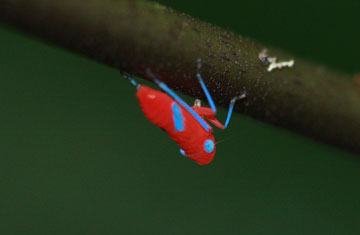Rainforest species particularly vulnerable to global warming
Rainforest species particularly vulnerable to global warming
mongabay.com
June 8, 2008
|
|
Tropical species may be particularly vulnerable to global warming due to their limited ability to adjust to high temperatures, warn scientists writing in the journal Science.
Joshua Tewksbury of the University of Washington and colleagues say that cold-blooded tropical animals — including insects, fish, reptiles and amphibians — are especially vulnerable to rising temperatures because they are physiologically specialized with respect to temperature, have limited abilities to acclimatize to new temperatures, and live in places that are already among the warmest on the planet. The authors argue that slight rises in overall global temperature could lead to “steep declines in thermal performance and Darwinian fitness”.
 Insect in Suriname |
Tewksbury and colleagues say tropical forest species may be particularly at risk as “they live in constant shade, are not generally adapted to the high operative temperatures found in warmer open habitats, and have few behavioral options available to evade rising temperatures temperatures.”
The bulk of global biodiversity is found in tropical forests.
Joshua J. Tewksbury, Raymond B. Huey, Curtis A. Deutsch (2008). Putting the Heat on Tropical Animals 6 JUNE 2008 VOL 320 SCIENCE
Related articles
Biodiversity extinction crisis looms says renowned biologist March 12, 2007
What do tigers in India, chameleons in Madagascar, redwood trees in California, and tube worms living in deep-sea hydrothermal vents have in common? They are all components of Earth’s biological diversity, or “biodiversity” for short. Biodiversity is the sum of all living organisms on the planet. It is also what makes life on Earth livable for our species. Biodiversity is the basis for ecological services that range from water filtration to food production to carbon cycling, and are worth tens of trillions of dollars per year. However, despite this importance, biodiversity is increasingly threatened. Human activities are fast diminishing the hotbeds of biological richness—rainforests, wetlands, coral reefs, and grasslands—and risk turning the planet into a biologically impoverished place. The implications for mankind could be quite serious. Ecologists warn that by extinguishing biodiversity, we risk our own quality of life, gamble with the stability of climate and local weather, threaten the existence of other species
Just how bad is the biodiversity extinction crisis? February 6, 2007
In recent years, scientists have warned of a looming biodiversity extinction crisis, one that will rival or exceed the five historic mass extinctions that occurred millions of years ago. Unlike these past extinctions, which were variously the result of catastrophic climate change, extraterrestrial collisions, atmospheric poisoning, and hyperactive volcanism, the current extinction event is one of our own making, fueled mainly by habitat destruction and, to a lesser extent, over-exploitation of certain species. While few scientists doubt species extinction is occurring, the degree to which it will occur in the future has long been subject of debate in conservation literature. Looking solely at species loss resulting from tropical deforestation, some researchers have forecast extinction rates as high as 75 percent.